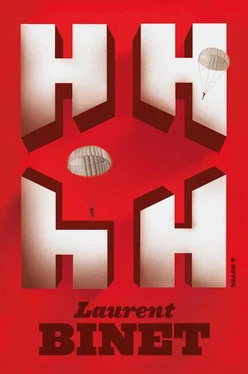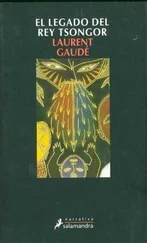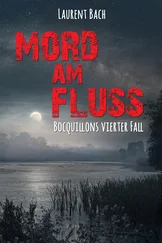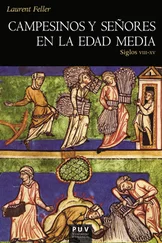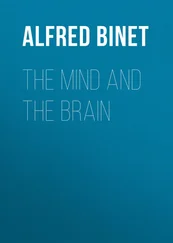Laurent Binet - HHhH
Здесь есть возможность читать онлайн «Laurent Binet - HHhH» весь текст электронной книги совершенно бесплатно (целиком полную версию без сокращений). В некоторых случаях можно слушать аудио, скачать через торрент в формате fb2 и присутствует краткое содержание. Город: New York, Год выпуска: 2012, ISBN: 2012, Издательство: Farrar, Straus and Giroux, Жанр: Историческая проза, на английском языке. Описание произведения, (предисловие) а так же отзывы посетителей доступны на портале библиотеки ЛибКат.
- Название:HHhH
- Автор:
- Издательство:Farrar, Straus and Giroux
- Жанр:
- Год:2012
- Город:New York
- ISBN:978-0-374-16991-6
- Рейтинг книги:3 / 5. Голосов: 1
-
Избранное:Добавить в избранное
- Отзывы:
-
Ваша оценка:
- 60
- 1
- 2
- 3
- 4
- 5
HHhH: краткое содержание, описание и аннотация
Предлагаем к чтению аннотацию, описание, краткое содержание или предисловие (зависит от того, что написал сам автор книги «HHhH»). Если вы не нашли необходимую информацию о книге — напишите в комментариях, мы постараемся отыскать её.
HHhH — читать онлайн бесплатно полную книгу (весь текст) целиком
Ниже представлен текст книги, разбитый по страницам. Система сохранения места последней прочитанной страницы, позволяет с удобством читать онлайн бесплатно книгу «HHhH», без необходимости каждый раз заново искать на чём Вы остановились. Поставьте закладку, и сможете в любой момент перейти на страницу, на которой закончили чтение.
Интервал:
Закладка:
On the other hand, the actor who plays Heydrich in the Douglas Sirk film is excellent. For a start, there is a physical resemblance. But he also manages to convey the character’s brutality without overdoing the facial tics—whereas Lang sacrificed subtlety in order to emphasize Heydrich’s degenerate soul. Now, it’s true that Heydrich was an evil, pitiless swine, but he wasn’t Richard III. The actor in Sirk’s film is John Carradine, the father of David Carradine, alias Bill in the Tarantino films. The most successful scene is that of Heydrich on his deathbed: eaten away by fever, he delivers a cynical speech to Himmler that is not without a kind of Shakespearean resonance, but which seems at the same time quite plausible. Neither cowardly nor heroic, the Hangman of Prague passes away without repentance, without fanaticism, regretting only that he must leave a life to which he felt attached—his own.
I did say plausible .
11
Months flow past, they become years, and all that time this story keeps growing inside me. And while my life passes—made up, like everyone’s, of private joys, dramas, hopes, and disappointments—the shelves of my apartment fill up with books on the Second World War. I devour everything I can find, in every possible language. I go to see all the films that come out— The Pianist , Downfall , The Counterfeiters , Black Book —and my TV remains stuck on the History Channel. I learn loads of things, some with only a distant connection to Heydrich, but I tell myself that everything can be useful, that I must immerse myself in a period to understand its spirit—and the thread of knowledge, once you pull at it, continues unraveling on its own. The vastness of the information I amass ends up frightening me. I write two pages for every thousand I read. At this rate, I will die without even having mentioned the preparations for the attack. I get the feeling that my thirst for documentation, healthy to begin with, is becoming a little bit dangerous—a pretext, basically, for putting off the moment when I have to start writing.
At the same time, I have the impression that everything in my daily life is bringing me back to this story. Natacha rents a studio apartment in Montmartre: the entry code for the door is 4206; I think straightaway of June 42. Natacha tells me the date of her sister’s wedding: I yell cheerfully, “May twenty-seventh? Unbelievable! The day of the assassination!” Natacha shakes her head. Going through Munich last summer on our way back from Budapest, we witness something staggering in the main square of the old town: a neo-Nazi rally. The shamefaced locals tell me they’ve never seen such a thing. I don’t know if I believe them. I watch, for the first time, an Eric Rohmer film on DVD: the main character, a double agent in the 1930s, meets Heydrich in person. In a Rohmer film! It’s funny how, as soon as you take a close interest in a subject, everything seems to bring you back to it.
I also read lots of historical novels, to see how others deal with the genre’s constraints. Some are keen to demonstrate their extreme accuracy, others don’t bother, and a few manage skillfully to skirt around the historical truth without inventing too much. I am struck all the same by the fact that, in every case, fiction wins out over history. It’s logical, I suppose, but I have trouble getting my head around it.
One successful model, in my opinion, is The Bloody Baron , by Vladimir Pozner, which tells the story of Baron Ungern—the one encountered by Corto Maltese in Corto Maltese in Siberia . Pozner’s novel is divided into two parts: the first takes place in Paris and recounts the author’s research as he collects various accounts of his character. The second plunges us into the heart of Mongolia, and we find ourselves all at once in the novel itself. I reread this passage from time to time. In fact, the two parts are separated by a short transitional chapter entitled “Three Pages of History,” which ends with the line “1920 had just begun.”
I think that’s brilliant.
12
Maria has been clumsily trying to play the piano for perhaps an hour when she hears her parents return. Bruno, the father, opens the door for his wife, Elizabeth, who is carrying a baby in her arms. They call the little girl: “Come and see, Maria! Look, it’s your little brother. He’s very small and you have to be really nice to him. His name is Reinhardt.” Maria nods distractedly. Bruno leans gently over the newborn: “How handsome he is!” he says. “How blond he is!” says Elizabeth. “He will be a musician.”
13
Of course I could, perhaps I should—to be like Victor Hugo, for example—describe at length, by way of introduction, over ten pages or so, the town of Halle, where Heydrich was born in 1904. I would talk of the streets, the shops, the statues, of all the local curiosities, of the municipal government, the town’s infrastructure, of the culinary specialities, of the inhabitants and the way they think, their political tendencies, their tastes, of what they do in their spare time. Then I would zoom in on the Heydrichs’ house: the color of its shutters and its curtains, the layout of the rooms, the wood from which the living-room table is made. Following this would be a minutely detailed description of the piano, accompanied by a long disquisition on German music at the beginning of the century, its role in society, its composers and how their works were received, the importance of Wagner… and there, only at that point, would my actual story begin. I remember one interminable digression in The Hunchback of Notre Dame on the workings of judicial institutions in the Middle Ages. I thought that was very clever. But I skipped the passage.
So I’ve decided not to overstylize my story. That suits me fine because, even if for later episodes I’ll have to resist the temptation to flaunt my knowledge by writing too many details for this or that scene that I’ve researched too much, I must admit that in this case—regarding Heydrich’s birthplace—my knowledge is a bit sketchy. There are two towns in Germany called Halle, and I don’t even know which one I’m talking about. For the time being, I think it’s not important. We’ll see.
14
The teacher calls the pupils one by one: “Reinhardt Heydrich!” Reinhardt steps forward, but another child raises a hand: “Sir! Why don’t you call him by his real name?” A shiver of pleasure spreads through the class. “His name is Süss, everyone knows that!” The class explodes, the pupils roar. Reinhardt says nothing: he clenches his fists. He never says anything. He has the best marks in the class. Later that day, he will be the best at P.E. And he’s not a Jew. At least he hopes not. His grandmother remarried a Jew, apparently, but that’s got nothing to do with his family. This, at least, is what he’s understood from the public rumors and his father’s indignant denials. But in all honesty he’s not really sure. In the meantime, he’s going to shut them all up in P.E. And this evening, when he gets home, before his father gives him his violin lesson, he’ll be able to boast that he was top of the class again. And his father will be proud, and congratulate him.
But this evening the violin lesson won’t happen and Reinhardt won’t even be able to tell his father about school. When he gets home, he will learn that the country is at war.
“Why is there a war, Father?”
“Because France and England are jealous of Germany, my son.”
“Why are they jealous?”
“Because the Germans are stronger than they are.”
15
There is nothing more artificial in a historical narrative than this kind of dialogue—reconstructed from more or less firsthand accounts with the idea of breathing life into the dead pages of history. In stylistic terms, this process has certain similarities with hypotyposis, which means making a scene so lifelike that it gives the reader the impression he can see it with his own eyes. When a writer tries to bring a conversation back to life in this way, the result is often contrived and the effect the opposite of that desired: you see too clearly the strings controlling the puppets, you hear too distinctly the author’s voice in the mouths of these historical figures.
Читать дальшеИнтервал:
Закладка:
Похожие книги на «HHhH»
Представляем Вашему вниманию похожие книги на «HHhH» списком для выбора. Мы отобрали схожую по названию и смыслу литературу в надежде предоставить читателям больше вариантов отыскать новые, интересные, ещё непрочитанные произведения.
Обсуждение, отзывы о книге «HHhH» и просто собственные мнения читателей. Оставьте ваши комментарии, напишите, что Вы думаете о произведении, его смысле или главных героях. Укажите что конкретно понравилось, а что нет, и почему Вы так считаете.
